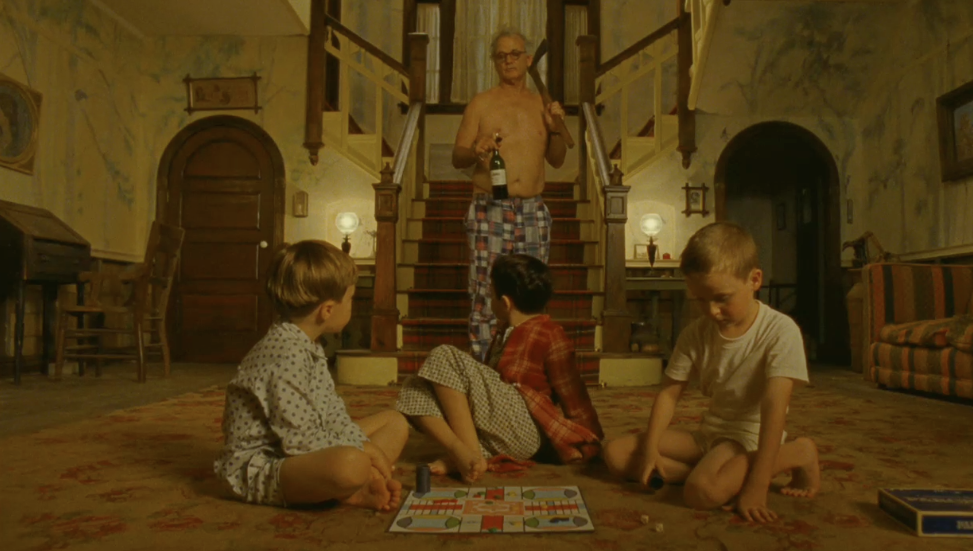Written by Wes Anderson and Roman Coppola
Directed by Wes Anderson
USA, 2012
Nearly 15 years since he last put a child front and center in one of his films, writer/director Wes Anderson does so again in his charming and sweet new film Moonrise Kingdom. Though none of the characters here are quite as memorable or striking as Max Fischer was in Rushmore, Anderson has created another insular, dysfunctional, prickly world with two frustrated young lovers at its core. Their story is what drives Moonrise Kingdom, despite the ample support from an offbeat adult ensemble including Bruce Willis and Bill Murray.
Anderson and co-writer Roman Coppola waste no time in kickstarting the film, set on the fictional New England town New Penzance Island, as we open with Khaki Scout Master Ward (Edward Norton) finding one of his troops, Sam Shakusky, gone after tending his letter of resignation from the troop. It turns out that Sam has absconded with Suzy Bishop, a local girl who’s bonded with Sam through a series of letters and decides she wants to run away with him to points unknown. The other adults in town, including Suzy’s lawyer parents (Frances McDormand and Murray) and the local police chief (Willis), begin a search instantly but run up against personal troubles as well as an impending and very powerful storm.
Wes Anderson has been, and continues to be, one of the most vital modern American filmmakers, but his style is the very definition of the phrase “acquired taste.” He blends honest emotion with hefty doses of artifice in even his best work, The Royal Tenenbaums; this balance can be hard to achieve in a film as a whole, but when it works, it’s poetic and beautiful to behold. Moonrise Kingdom doesn’t always hit the right notes—some key moments in the climax are engineered in such a way that Anderson is acknowledging the heightened unreality of his world—but finds its soul with those young lovers. Played by newcomers Jared Gilman and Kara Hayward, Sam and Suzy have a rushed, awkward, but perfectly engrossing romance. In a film whose circumstances are often self-consciously outrageous, Sam and Suzy manage to ground the story with their budding love.
Gilman and Hayward work so well thanks to not feeling like trained child actors. The other Khaki Scouts, a source of consistent and enjoyable comic relief, read their lines with more panache but the two lead children have an unforced, loose quality to their performances. The rest of the cast is more than able, though the adults who make a stronger impact are those with more material. Willis and Norton, both newcomers to the world of Wes Anderson films, fit in nicely as two well-meaning authority figures who would make better choices if they weren’t so frequently unaware of what’s actually going on. Murray and McDormand have one remarkable scene in separate beds, but otherwise only stand out simply because they’re Bill Murray and Frances McDormand. Others, such as Tilda Swinton and Jason Schwartzman, are funny for a few minutes but fairly unimportant to the overall story.
Moonrise Kingdom’s only true problem is an oddly constructed first act, where we watch the adults try to figure out what’s going on, before Anderson and Coppola slowly let the audience in on the game. While bringing together this motley crew so they can begin to slam against each other and further distance themselves from the kids they’re trying to rescue is a smart idea, it creates a challenge for the viewer. The connection we feel here is to those kids; delaying their introduction—though we see Suzy in the opening scene, we don’t even meet Sam for about 15 minutes—seems like a misstep. Another, more minor issue is that its framing device—clever narration provided in person by a bearded Bob Balaban—is used so sporadically that it almost feels unnecessary.
Though it’s not nearly as striking or moving as The Royal Tenenbaums or The Darjeeling Limited, Moonrise Kingdom further establishes Wes Anderson as a director and writer who may couch his stories in a quaint, idiosyncratic artifice, but knows how to engage audiences. Here, he may fumble a bit with bringing to life an entire town or the adults who live in it, but with the help of two young actors, he creates a central relationship brimming with honesty, life, and passion. At his best, Anderson is able to break through the fantasies he builds from the ground up and deliver a gut-punch of heartbreak and angst. In Moonrise Kingdom, he doesn’t deliver such a punch wholly, but even in part, that emotion is what makes his work so special.
– Josh Spiegel





